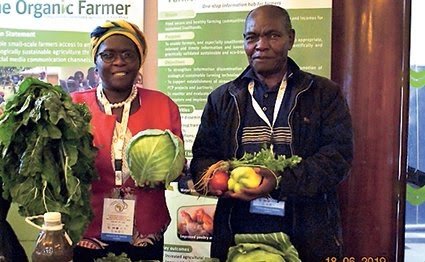
Scientists urge farmers to use compost or animal manure to nourish the soil, and organic-based pesticides to control crop pests and diseases.
Excessive use of pesticides kills pollinators such as bees, impacting negatively on food security.
Farmers at the conference, however, showed organic farming is not only doable, but also cost-effective.
At the same time, she uses integrated pests management practices to control pests on her farm. This is by using herbal concoctions made from African marigold and tithonia.
Ferdinand Wafula, an organic farming extension officer at Participatory Ecological Land Use Management (PELUM), says farmers can restore soil fertility using organic manure and compost.
This week, global scientists, researchers, policymakers and farmers convened in Nairobi for the agroecology and organic farming conference.
Over the years, a section of researchers and health enthusiasts advocating for organically produced crops have protested against the excessive use of chemical based pesticides and fertilisers on the grounds that they pose a danger to people and environmental health.
The scientists instead urge farmers to use compost or animal manure to nourish the soil, and organic-based pesticides to control crop pests and diseases.
However, a majority of farmers argue that producing crops without fertilisers and pesticides in the era of climate change and high influx of pests and diseases is almost unachievable.
However, the world is going organic. The European Union, for instance, has put a premium on organic farming, and stringent rules on pesticides use to check on chemical residues levels on food crops.
Farmers at the conference, however, showed organic farming is not only doable, but also cost-effective. Margaret Karanja, an organic farmer from Limuru, said that she grows vegetables and herbs both in the greenhouse and outdoor by exclusively using animal manure and liquid fertiliser from earthworms.
“I have three greenhouses. I grow my crops without using any inorganic inputs,” explained Karanja, a retired teacher.
The crops include tomatoes, sukuma wiki (collard greens) and spinach.
At the same time, she uses integrated pests management practices to control pests on her farm. This is by using herbal concoctions made from African marigold and tithonia.
RESTORE SOIL FERTILITY
“We control greenhouse pesticide such as whiteflies using yellow and blue stickers to trap them, the flies are always attracted to yellow colour,” she explained.
The farmer delivers her produce at City Park Market in Nairobi twice a week.
Veronica Kinuthia, who farms in Kinangop in Nyandarua County, is another organic grower.
She grows legumes, chives, Chinese cabbages and a number of herbs which she sells locally.
“I was trained on organic farming by Biovision. I then decided to grow the vegetables especially herbs because not many people grow them in our area,” she explained.
Her clients include the Chinese road contractors who prefer the cabbages. A kilo of the cabbage goes for Sh50.
“The biggest challenge in our area is frost which is common between January and March,” she noted.
Water is also a challenge, therefore, she recycles her kitchen water.
“I add ash in the water at night and in the morning I use the water to irrigate the crops and control frost,” she explained.
Ferdinand Wafula, an organic farming extension officer at Participatory Ecological Land Use Management (PELUM), says farmers can restore soil fertility using organic manure and compost.
“Using chemical foliar sprays weakens the leaves by killing the microbe. This is why it’s important to use organic liquid fertiliser,” he said.
Dr David Amudavi, the Biovision executive, urged farmers to scale up organic farming to meet the high demand in the market.
He said excessive use of pesticides kills pollinators such as bees, impacting negatively on food security.







